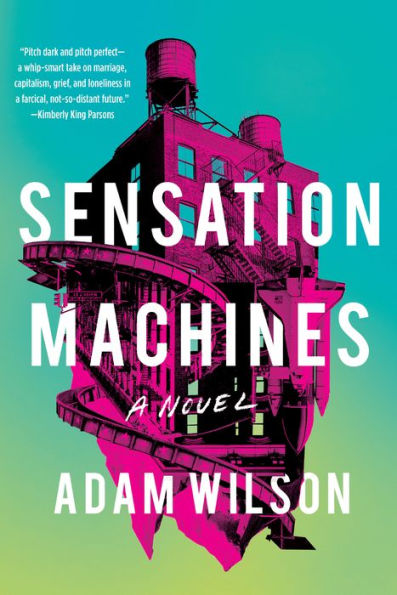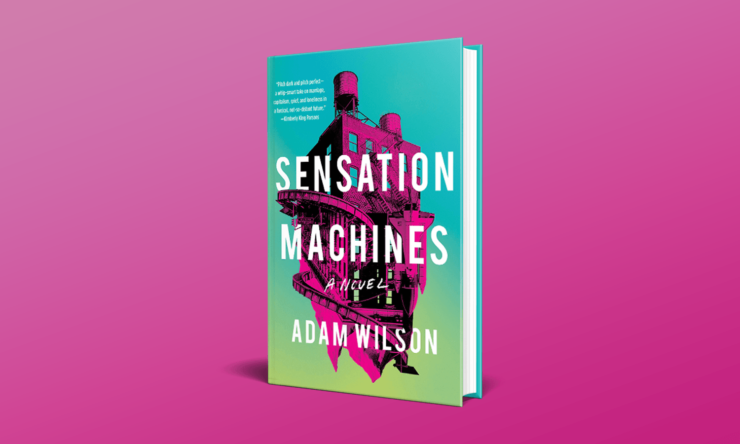At first glance, the setting of Adam Wilson’s new novel Sensation Machines is a familiar-looking New York City. Everyone who’s not supremely wealthy feels some sense of economic uncertainty, writers process the pop culture of their youth into sprawling critical works, and finance bros debate the merits of cryptocurrency. But the near-future setting of Wilson’s novel offers some stark differences as well. Bird-shaped drones now populate the skies and have taken most retail and food service jobs. A Cuban lung cancer vaccine has made smoking popular again. The hotly debated political issue of the moment is a Universal Basic Income for the nation, hinging on the vote of a centrist New York Senator. And—perhaps most shockingly—the Knicks have gotten so bad that Spike Lee has abandoned them.
Sensation Machines begins by focusing on a slowly disintegrating marriage and gradually expanding outwards from there. Its first section is narrated, in alternating chapters, by Michael and Wendy, a well-to-do Brooklyn couple whose marriage is imploding in the wake of their daughter’s death. Michael works in finance and has lost nearly all of the couple’s money on bad investments. Wendy works for a company called Communitive.ly, described as “a Think Tank for Creative Synergy and Digital Solutions.” When the novel opens, Wendy is deep in the midst of a high-profile assignment for a client known only as Project Pinky.
The first part of Sensation Machines also offers lived-in glimpses of the ways this near future New York—and America, really—have changed. One is the way that the Occupy Wall Street movement has evolved into something broader, now referred to as #Occupy. One of its leading lights is a public intellectual named Jay Devor, who has a prominent role in public protests occurring throughout the city and who Michael is chatting up in the hopes that Devor will publish Michael’s treatise on the cultural importance of Eminem. Michael isn’t the only writer in the novel’s increasingly sprawling cast. There’s also Donnell, the novel’s most prominent Black character, who maintains a blog blending labor theory and pop culture acumen. (“A recent post defended NBA salaries from a Marxist perspective,” Michael notes.) But Donnell is also harried from working two jobs; this is a novel in which no one, save the incredibly wealthy, feels economically secure.
Buy the Book


Sesation Machines
From the earliest pages of the novel, we know that another major character—Michael and Wendy’s friend Ricky—is not long for this world. Ricky is Michael’s oldest friend, and his polar opposite in many ways—Ricky is gay while Michael is straight; Ricky is hedonistic while Michael is buttoned-down; Ricky is wildly successful while Michael is desperate for money. Ricky is an avid player of an augmented reality game called Shamerican Sykosis—one that involves its own cryptocurrency, which has made some people very wealthy. And when Ricky is shot and killed at a dionysian finance party—one crashed by a number of #Occupy protestors—Michael is one of many trying to determine is his old friend’s murder was due to class anxiety, robbery, or something else entirely.
Wilson parcels out information about Shamerican Sykosis in bits and pieces, but also includes one memorable scene in which Michael, augmented reality helmet on, wanders into a virtual PSA about gun violence that’s indistinguishable from a real massacre. It’s a particularly shocking scene in a novel that offers quite a few, and it’s also a deft use of near-future technology.
The Shamerican Sykosis plotline is one of two areas in which the speculative elements of Sensation Machines really come to the foreground. The other is via the work Wendy is hired to do by a wealthy man named Lucas, who envisions a future in which people wear biometric suits and helmets that allow them to monetize every piece of personal information they have. While there’s certainly some precedence for this—remember the MoviePass business model?—Wilson also does a good job of showing how this would appeal to both corporate overlords and the people who might end up wearing these suits. A running thread, for instance, is that they might be able to detect life-threatening health conditions at an early stage, making their appeal seem entirely plausible, even to people who might otherwise balk at their invasion of privacy.
Lucas’s goal is to rally public opinion against the UBI bill up for a Senate vote, and does so via an ad campaign with the hashtag #WORKWILLSETYOUFREE. If that sounds familiar, it’s because it’s best known for its presence above an entrance to Auschwitz. Between that and the fact that Shamerican Sykosis is often abbreviated as SS—and to say nothing of Lucas’s distinctively blond hair—Lucas is presented as a thoroughly unsettling figure, narratively speaking.
The question of who killed Ricky is answered fairly early on in the novel; what propels it is more of a question of why they did so—and who will end up taking the fall for it. A duo of morally deficient cops arrest Donnell for the killing, while Lucas hopes to pin the crime on Devor and thus sink the UBI vote. Sensation Machines might be set in the near future, but the concerns that fuel its plot—systemic racism, economic anxiety, and corporatist entities looking to sink laws that could lead to real change—feel decidedly relevant in 2020.
Wilson’s earlier fiction shares with this novel a penchant for wry dialogue, comic setpieces, and a sense of his characters being morally tested. The speculative elements in this novel help elevate those moral concerns to a much higher level; there’s a sense throughout that the UBI vote represents a nation’s last and best hope for positive change. The characters in Sensation Machines are grappling for a better life; they’re also trying hard to keep their souls intact. And in the not-so-distant future, pulling that last one off is even harder than it is today.
Sensation Machines is available from Soho Press.
Read an excerpt here.
 Tobias Carroll is the managing editor of Vol.1 Brooklyn. He is the author of the short story collection Transitory (Civil Coping Mechanisms) and the novel Reel (Rare Bird Books).
Tobias Carroll is the managing editor of Vol.1 Brooklyn. He is the author of the short story collection Transitory (Civil Coping Mechanisms) and the novel Reel (Rare Bird Books).










